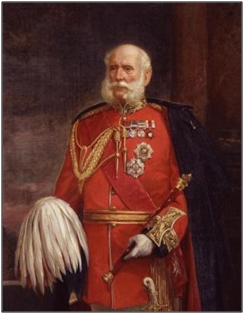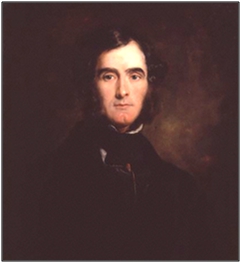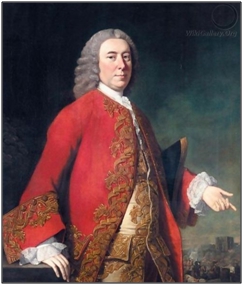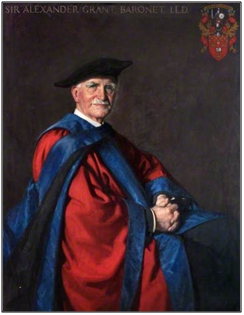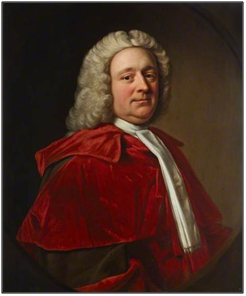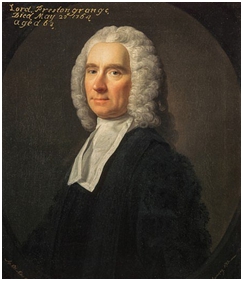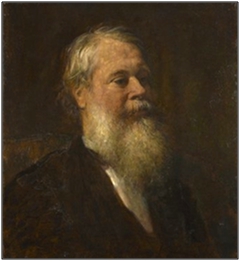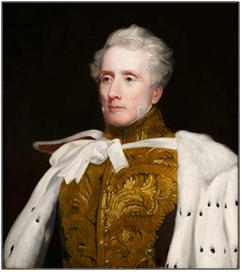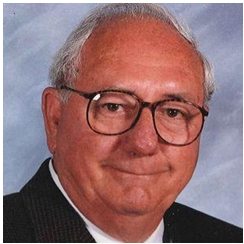Noteworthy Descendants
Field Marshal Sir Patrick Grant, GCB, GCMG, Gold Stick to Her Majesty Queen Victoria (1804-1895), was the second son of Major John Grant of Auchterblair, of the 97th Regiment of Foot, and a descendant of the ancient family of the Grants of Tullochgorm. As a sixteen year old lad he participated in the famous Clan Grant march on Elgin in 1820. He entered the Bengal (India) Infantry that same year. As a senior officer he was Commander in Chief of India (1856-1857), Governor of Malta (1867-1872), and Governor of the Royal Chelsea Hospital (1874-1895).
Sir Francis Grant, PRA (1803-1878) was a descendant of the Grants of Glenlochy and Kilgraston. He was a painter known primarily for his hunt scenes and portraits of the landed gentry. He painted Her Majesty Queen Victoria and many other distinguished British aristocrats, political figures and military officers, including his own brother, General Sir James Hope Grant. In 1866, he was elevated to the Presidency of the Royal Academy in London and awarded a knighthood shortly thereafter.
General James Grant of Ballindalloch had a distinguished military career and spent much of his time in America. He was a major in the American French and Indian War, led an expedition against the Cherokees in North Carolina in 1761, and served as Governor of East Florida (1763-1771). He served in the American War of Independence before retiring to his estate in Scotland. After his career in the army, he was elected Member of Parliament. For his lifetime of service, he was presented full-sized portraits of King George III and Queen Charlotte. The paintings still adorn the walls of the dining hall at Ballindalloch Castle.
Hugh John Mungo Grant is a well-known English film actor and producer. After his role in Four Weddings and a Funeral (1994), Grant established himself as a leading man in a variety of roles, particularly romantic comedies. He was born in Hammersmith, London, in 1960. His mother is related to a number of English and Scottish aristocrats, including the Earl of Nottingham, Viscount Strathallan, and the Marquess of Atholl. His father, Captain James Murray Grant, was trained at Sandhurst and served with the Seaforth Highlanders in Malaya, Germany and Scotland. His grandfather, Major James Murray Grant, DSO, was decorated for bravery during World War II. The family descends from the Grants of Glenmoriston.
Sir Alexander Grant of Forres, 1st Baronet (1864-1937), was a self-made man. As a young man, he secured employment in a bakery in Queensferry and worked his way up the corporate ladder to become Chairman and Managing Director of McVitie & Price, which later became part of the United Biscuit Company. Sir Alexander was raised to the rank of Baronet by Prime Minister Ramsay MacDonald. He was a generous benefactor of the city of Forres, the University of Edinburgh, and the National Library of Scotland. Sir Alexander Grant had a son, Sir Robert McVitie Grant, who died without a male heir. The management of family business eventually devolved upon his daughter’s son, Hector Laing, later Lord Laing of Dunphail. Lord Laing became Chairman of the United Biscuit Company, a Director of the Bank of England, and a personal friend and advisor to Prime Minister Margaret Thatcher.
Patrick Grant of Easter Elchies, Lord Elchies (1690-1754), was the son of Captain John Grant of Easter Elchies. He was admitted the the Scots bar as an advocate in 1712. He became one of the Senators of the College of Justice in 1732 and was elevated to the position of Lord of Justiciary in 1737. Lord Elchies was the father of John Grant of Easter Elchies, who became Baron of the Exchequer of Scotland in 1755.
William Grant, Lord Prestongrange (c. 1701-1764) was a younger son of Sir Francis Grant, 1st Baronet of Monymusk, Lord Cullen, and brother of Sir Archibald Grant, 2nd Baronet. William Grant was admitted as an advocate in 1722 and in 1737 became Solicitor-General for Scotland. He was Member of Parliament for the Elgin Burghs and was a principal agent in the move to secure the abolition of heritable jurisdictions in Scotland. He became a Lord of Session and Justiciary in 1754 with the title Lord Prestongrange.
Sir John Peter Grant of Rothiemurchus, KCB, GCMG (1807-1893) was educated at Eton and spent time at Edinburgh University, the East India College in Haileybury and Fort William College in Calcutta. He joined the Bengal Civil Service and served as secretary to the government of Bengal (1848-1852), Governor General of the Central Provinces (1857-1859), and Governor of Jamaica (1866-1873).
Charles Grant, 1st Baron Glenelg, MP, PC was a descendant of the Grants of Sheuglie, in Glenurquhart, who became a prominent politician and colonial administrator. He was born in Kidderpore, Bengal, India, the eldest son of Charles Grant, Chairman of the British East India Company. He was educated at Magdalene College, Cambridge University. In 1811, Grant was elected Member of Parliament for the Inverness Burghs and held that seat until 1818. He later served as Lord of the Treasury, Chief Secretary for Ireland, a Privy Councillor, President of the Board of Trade, Treasurer of the Navy and Secretary of State for War and the Colonies. In 1835, he was created Baron Glenelg of Glenelg in the County of Inverness. Lord Glenelg died at Cannes, France, in 1866, at which time the barony became extinct.
George Henry Grant, Sr. (1929-2012), was the founder and long-time Convener and President of the Clan Grant Society – USA. He was the owner of the George Grant Company in Hixson, Tennessee. The company operates throughout the southeastern United States and represents a number of manufacturers of instrumentation and process equipment. George had a cheerful, positive attitude. He was a person about whom you could truthfully say, “His cup was never half-empty; it was always half-full.” George, and his wife Lucille, worked constantly to make the Clan Grant Society a success. No list of noteworthy Grants would be complete without the name George Grant.
[A more comprehensive presentation of Noteworthy Descendants of the Clan Grant is available at “A History of the Clan Grant” under the heading “For Members Only.”]
James Grant, historian
Clan Grant Society – USA
standfast@charter.net

